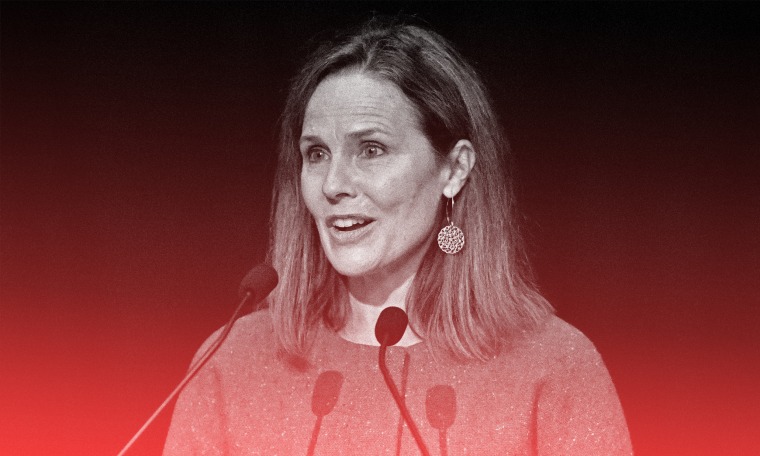At the celebration of the McConnell Center at the University of Louisville, established by Senate Minority Leader Mitch McConnell, R-Ky., one of the most partisan figures in modern history, Supreme Court Justice Amy Coney Barrett told us that the nation’s highest court is not, in fact, partisan.
McConnell is probably the last member of the human race a Supreme Court justice would want to share a stage with if she were serious about demonstrating that the court isn’t partisan.
“My goal today is to convince you that this court is not comprised of a bunch of partisan hacks,” Barrett said, days after she voted with the majority in a decision to allow Texas’ restrictive abortion law to go into effect. That decision was one of naked partisanship, unmoored from the typical constraints of small matters such as the need to adhere to prior case law.
Let’s take a moment to consider the messenger of this sentiment and the host of this event.
This is the same Justice Barrett who was confirmed to the Supreme Court as early voting in the 2020 election had begun throughout the nation. The timing of her nomination and confirmation matters. When her mentor, Justice Antonin Scalia, passed away in February 2016, McConnell, then the Senate majority leader, said that the Supreme Court vacancy would not be filled until after the presidential election in 10 months. The same McConnell ushered through Barrett’s nomination mere weeks before the 2020 election. McConnell is probably the last member of the human race a Supreme Court justice would want to share a stage with if she were serious about demonstrating that the court isn’t partisan.
Imagine former President Bill Clinton asking former White House intern Monica Lewinsky to introduce him for a speech about how people in positions of power should beware of creating sexually inappropriate work environments.
But Barrett found a fellow traveler waiting to embrace her judge-as-a-neutral-arbiter worldview: her liberal colleague, Justice Stephen Breyer. Barrett and Breyer may have different legal philosophies and political ideologies (two separate things, to be sure), but they’re currently united in their need to convince the public that they are not merely politicians with robes.
Their reputations, their legacies and their ability to justify their own decisions hinge on the fiction of a neutral court.
Barrett is the junior member of the conservative wing of the court, while Breyer is the senior member of the liberal wing. But for both of them, their reputations, their legacies and their ability to justify their own decisions hinge on the fiction of a neutral court.
Barrett must show us why her appointment as a Supreme Court justice — her nomination and confirmation — are not forever tinged with illegitimacy. Breyer must show why his desire to stay on the bench as long as he wants to is not supremely ill-advised.
There is a reason that “Breyer must retire” is a liberal rallying cry. If President Joe Biden is unable to fill his seat prior to the midterm elections, particularly when Democrats might lose their slimmest of majorities in the Senate, that could solidify a 7-to-2 conservative majority of the court for decades to come. So Breyer must tell us that not everything about the court is partisan in order to justify his own decision to hang on past the time when he should.
Sometimes people in positions of power make remarks that are so devoid of self-awareness that one wonders if the person has encountered a mirror. Sometimes people in positions of power make comments that strain the bounds of common sense and make us wonder if up is really above us, and down below. Other times, people in positions of power say things that reek of shameless justification for their positions. Barrett's and Breyer’s remarks may be examples of all three.
But let’s back up for a moment. The federal judicial branch is, in fact, not comprised of partisan hacks. In many cases, we have exactly what Chief Justice Roberts says we have, not “Obama judges or Trump Judges,” but rather “an extraordinary group of dedicated judges doing their level best to do equal right to those appearing before them.” There are hundreds of members of the federal judiciary. These are hardworking public servants who go to work every day to fairly apply the facts of cases to the law. Many of these judges do not encounter the same type of difficult legal questions that touch on both hot-button political and societal issues that Supreme Court justices do.
Presidents, the public and the nominees all know that Supreme Court justices will eventually confront the most controversial issues we face in society — abortion rights, gun control, equal rights, voting rights and religious freedom, to name just a few. There is no use in pretending that a “neutral” application of the law gives us the answers to these questions. That is why we fight so hard about the composition of the court. The views of those on the highest court matters, and sometimes, depending on the justice and the case, their views are more heavily grounded in political than legal analysis.
The thing that unites Barrett, at the beginning of her career on the Supreme Court, and Breyer, at the end of his, is their awe-inspiring self-validation in the form of trumpeting a judicial neutrality that does not always exist.

